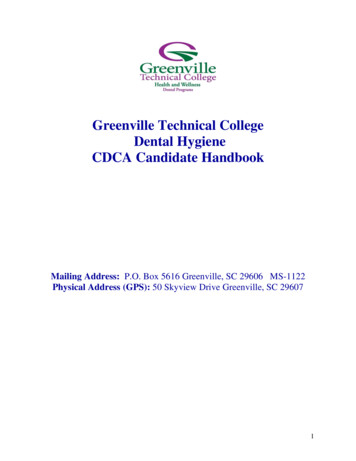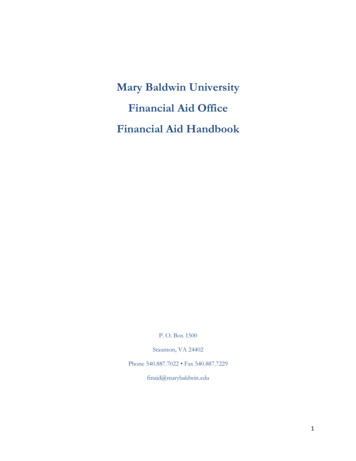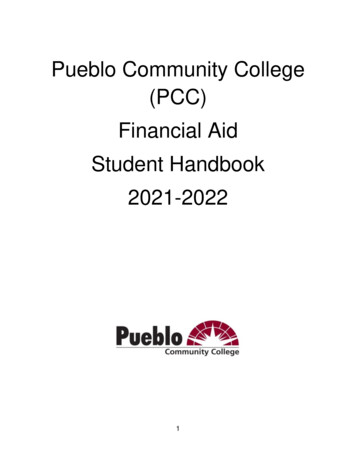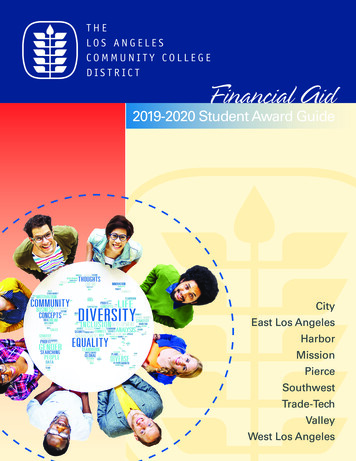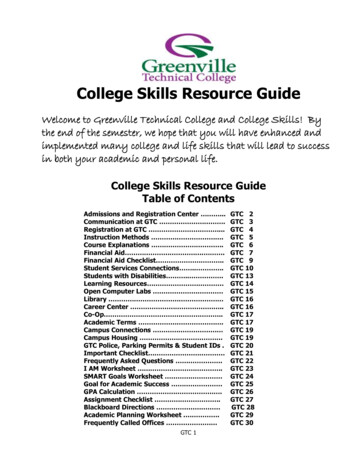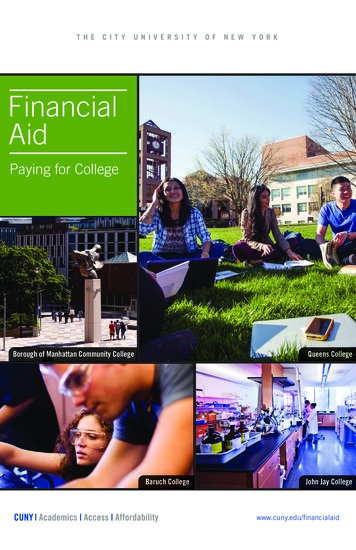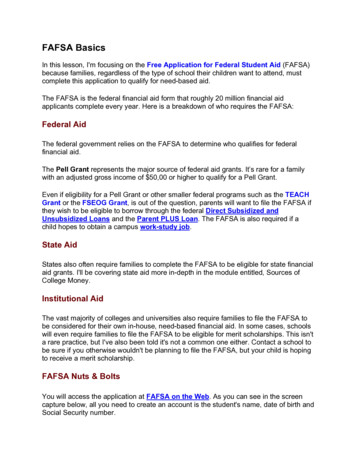
Transcription
Financial AidFINANCIAL AIDOffice of Financial AidLocated in the Driesbach/Anderson Student Success Center, BartonCampus Building 102, the Office of Financial Aid provides importantservice and information regarding financial aid to prospective, new andcurrent students at Greenville Technical College. The Office of FinancialAid provides assistance with the following items:Financial Aid Programs Federal Grants Work-Study Loans State Grants Scholarships Greenville Technical College Scholarships Private Scholarships LoansApplying for Financial Aid and Completing Forms Applying for a Federal Student Aid ID Completing and submitting a Free Application for Federal Student Aid(FAFSA) Assistance with finding a Federal Work-Study job and completing thedocuments necessary to begin working Assistance with the Satisfactory Academic Progress Evaluation forfederal financial aid eligibility and completing and submitting anappeal form Completing loan related forms at studentaid.gov. Direct Loan Master Promissory Note Entrance Counseling Annual Student Loan Acknowledgement Private Loan informationFinancial aid is monetary awards intended to assist students in payingfor their education. Awards are made available from grants, scholarships,loans and South Carolina Lottery Tuition Assistance from federal, state,institutional and private sources. Most financial aid is awarded in theform of an “award package” to meet the cost of education. Aid can assiststudents in pursuing their goals while studying at Greenville TechnicalCollege (GTC). Financial need, available funds, student classification,academic performance and sometimes the timeliness of the financial aidapplication determine the types and amounts of aid awarded.The Free Application for Federal Student Aid (FAFSA) is the federalapplication that must be completed to receive all federal aid, SouthCarolina Lottery and most scholarships. The FAFSA is completed onceper academic year (academic year includes Fall, Spring and Summerterms). Determination of eligibility through needs analysis must becompleted before aid is awarded.Verification is a quality-control method used by the U. S. Departmentof Education to check the accuracy of information submitted on theFAFSA and for resolving conflicting information in a student’s financial1aid record. Because students sometimes make errors on their application,colleges are required to have procedures for verifying the reportedinformation. Students are selected for verification either by CPS (CentralProcessing System) of the Department of Education or by the college.If the college has any information on an application that is inaccurateor conflicting, it is required by law to verify the information. A missinginformation email (MIE) is issued to the student. Dependent studentsmust submit signed copies of required documents for themselves andparents; independent students must submit signed copies of requireddocuments for themselves and spouse (if applicable). To receivemaximum consideration of aid, students should submit requesteddocuments within 15 days of notification. Financial Aid processorsmake corrections to a student’s record from the completed formsand documentation submitted by the student. The corrections aresent electronically to CPS, which in turn sends the college a correctedaid report. A student will not be able to receive financial aid until theverification process is complete.Visit our web page at https://www.gvltec.edu/financial aid/.PoliciesStandards of Satisfactory AcademicProgress PolicyGreenville Technical College has adopted the following Standards ofSatisfactory Academic Progress (SAP) Policy according to federal andstate regulations. Greenville Tech’s Standards of SAP Policy measures astudent’s performance in the following areas: completion rate, cumulativegrade point average (GPA) and maximum time frame. All studentsreceiving any federal and state student financial aid must adhere tothe college’s SAP policy. This SAP policy is in addition to the academicstandards required by the college.This SAP policy applies to all students applying for or receiving Title IVFederal Student Aid. The intent of this policy is to ensure that studentswho are receiving federal financial aid are making measurable progresstoward completion of a degree, diploma or certificate program withina reasonable time frame. To be eligible for Title IV Federal StudentAid, a program of study must require a minimum of 16 credit hours forgraduation.Financial Aid monitors the SAP of all financial aid recipients eachpayment period by reviewing a student’s total academic record aftergrades are posted at the end of each semester. Students’ failure to meetany one of three standards may result in the cancellation of their awards.Visit our web page at https://www.gvltec.edu/sap/.SAP RequirementsThe SAP requirements for Greenville Technical College are summarizedbelow. Cumulative Completion RateA student must successfully complete 67% of the cumulative hoursattempted, including developmental courses. These courses count towards hours attempted and GPA andwill be considered in determining the Standards of AcademicProgress. Students may not take more than 30 credit hours ofdevelopmental courses. Courses with grades including but not limited to F, W, WF, WA, Iand U are not considered completed hours. Grade Point Average
2Financial AidFinancial aid recipients must maintain a minimum cumulative GradePoint Average (GPA) of 2.0. All attempted courses (Including repeatedcoursework) are counted in GPA. Length of EligibilityFinancial aid recipients must complete their program of study withouthaving attempted more than 150 percent of the credit hours requiredto complete their curriculum. For example, a student enrolled in aprogram of study requiring 30 credit hours to complete, may notattempt more than 45 total credit hours (i.e. 30 x 150 percent 45).This limit includes transfer credit earned. If a student graduates froma program, the average number of credit hours required to graduatewith an equivalent credential at Greenville Technical College will besubtracted from their cumulative attempted credit hours. The newmodified cumulative attempted credit hour number will be used tocalculate their 150% length of eligibility on their new program. We willonly give credit for one graduated program. Only the degree with thehighest number of required hours will be counted.SAP Statuses SatisfactoryFirst-time students, and all returning students who have a cumulativeGPA of 2.0 or greater, with a course completion rate of 67% orgreater that have not exceeded the 150% length of eligibility will beconsidered “Satisfactory” and will be eligible for Federal financial aidwith no restrictions. WarningAfter the first semester that financial aid recipients fail to meetthe minimum standards (have not completed two-thirds of theircumulative attempted hours and/or have not achieved a cumulative2.0 GPA) they will be placed on financial aid warning. Financial aid recipients can receive financial aid while on warning.while they progress towards meeting cumulative SAP standards ordegree completion. If a student fails to meet their Academic Plan anddoes not meet cumulative SAP, they will revert to Ineligible status.Under the terms of a student’s Academic Plan they must complete all ofthe following: Register for a minimum of six credit hours. Complete the semester with a minimum GPA of 2.5. Complete all attempted hours (No withdrawals or failures). Continue to work towards graduation within the number of credithours approved for the specified program on the SAP Appeal.ReinstatementTo regain eligibility, a student must meet one of the following criteria: Use personal funding to pay for classes until they have met theoverall Satisfactory Academic Progress standards of 2.0 GPA, andcumulative completion rate of 67%, and have not exceeded the 150%length of eligibility requirement. If a student failed to meet SAP due to his injury or illness, death ofa relative or other special circumstance, the student may appeal tohave financial aid reinstated. If approved, the student will be placedeither on Probationary status or an Academic Plan.Appeal ProceduresStudents will only be allowed to submit two appeals. The Academic Planappeal will count as the first appeal. Students who become ineligible forfinancial aid may file an appeal. An appeal must consist of the followingitems: To ensure that we are at least as strict as the college’s AcademicNotice policy, students who are on financial aid warning statusare advised to take no more than 12 credit hours per term.1. A typed personal statement that Outlines the extenuating circumstances that prevented thestudent from meeting the Standards of Satisfactory AcademicProgress policy. At the end of a warning semester, the financial aid recipient whofails to meet cumulative SAP will become ineligible for financialaid for the next semester. States why it is possible to improve upon past academicperformanceStudents who exceed the 150% length of eligibility willautomatically go Ineligible without a Warning term. IneligibleFailure to meet the standards of Satisfactory Academic ProgressPolicy at the end of a Warning term will result in an “ineligible” status. Students who are on “Ineligible” status is no longer eligible toreceive federal financial aid. Students are required to pay for their courses out of pocket or setup a payment plan with the Business Office. Students who exceed the 150% length of eligibility willautomatically become Ineligible if they have not graduated fromtheir program of study. Academic Plan and ProbationIf a student is on an Ineligible status, they may have the option tosubmit a financial aid appeal as outlined below. A student who hassubmitted and been approved for an Academic Plan will be placedon an “Academic Plan” status. Students who are approved for thisstatus are generally unable to meet cumulative SAP standards withinone semester and are held to the terms of their academic plan inorder to assist the student as they progress back to meeting thecumulative Standards of SAP. Students who continue to meet theterms of their Academic Plan will remain eligible for financial aid Explains the corrective action taken with a detailed success planfor current and future semesters.2. Include acceptable documentation that relates to the specificsemester(s) during which the student’s academic performance wasaffected. Examples of acceptable documentation include: Birth/death certificates, obituaries, funeral programs ofimmediate family members (i.e. parents, grandparents, spouses,children, brothers, sisters). Medical records on physician’s or hospital’s letterhead withthe appropriate signatures that confirm illness and length ofrecuperation. Court documents. Statements from physicians, counselors, clergy or social workerson company letterhead, with the appropriate signatures. Statement from work supervisor on company letterhead with theappropriate signature.If a student has exceeded the maximum attempted hours (150percent rule), he or she must also: Provide a personal statement explaining why accumulatedattempted hours exceed current degree requirements.To ensure all unsuccessful terms are addressed, a student may obtainand review a copy of their unofficial transcript before submitting an
Financial Aidappeal. The inclusion of supporting documentation as outlined abovedoes not guarantee that an appeal will be granted. Each appeal willbe reviewed on a case-by-case basis. Appeals submitted withoutdocumentation are not accepted.The Financial Aid Appeals Committee will review the appeal. The decisionof the committee is final. The student will be informed via campus e-mailof the final decision. The date of the decision is provided to the studentat the time of appeal submission. Appeal deadlines are established foreach semester and a student may not appeal for a prior semester afterthat semester deadline has ended.If approved, the Financial Aid Office will determine whether to place thestudent on an Academic Plan or one Probation semester. Students willbe evaluated each semester to ensure they are meeting the terms of theirAcademic Plan. Only students whose appeal is approved will have theoption to submit a future appeal, should other unforeseen circumstancesoccur.Academic issues that will affect Satisfactory Academic Progress include: Course repetitions, withdrawals, incomplete courses, transfer creditsand all other grades — All grades are counted in the hours attempted. Developmental courses — Financial aid recipients can only attempta maximum of 30 credit hours of developmental coursework and/or Transitional Studies coursework, which consist of 100 or lowerlevel courses in the area of College Orientation, English, Reading, andMath. These courses include but are not limited to ENG 032, ENG 100,RDG 032, RDG 100, RWR 100, MAT 100, MAT 105, COL 103, COL 107and CHM 100. Change of major — A financial aid recipient who changes his orher course of study is still responsible for maintaining satisfactoryprogress. A financial aid recipient changing from one program toanother may lose federal and state eligibility immediately uponmaking the change. When considering a change in major, a studentshould consult the Office of Financial Aid to discuss the effect of thischange on his/her satisfactory academic progress. Federal and stateregulations prohibit the awarding of financial assistance beyond 150percent of the published program length. Returning students’ academic record — Federal financial aidregulation requires colleges to track a student’s academic progressfrom the first date of enrollment, whether or not financial aid wasreceived. Students returning to college after a break in enrollmentshould consult the Office of Financial Aid to determine how theircollege academic history will affect eligibility for financial aid.Financial Aid PoliciesOffice of Financial Aid Information Disclosure PoliciesThe Office of Financial Aid at Greenville Technical College strives toprotect the confidentiality and privacy of student records as requiredby law. The Family Educational Rights and Privacy Act of 1974 (asamended), commonly referred to as the Buckley Amendment, sets forththe educational information of a student and how the information shouldbe treated to protect student privacy.Advice to Students, Parents and External PartiesSeeking Student Financial Aid InformationThe Office of Financial Aid recommends that custodial parents, noncustodial parents, spouses and interested third parties seek financialaid award information directly from the student. Students have quickand easy access to their financial aid, billing and grade report records3via the student portal. If information will be required by a third party, anInformation Release Authorization Form must be signed by the studentand placed on file with the Office of Student Records.Greenville Tech’s financial aid staff may provide custodial parents withgeneral, non-student specific financial aid information, but are notrequired to do so. In some instances, the Financial Aid office reserves theright to refer some custodial parents’ questions back to the student toprotect the confidentiality of student records.Greenville Technical College Student Financial AidInformation Release PracticesFor financial aid purposes, parent definitions and independent studentdefinitions are defined by federal student aid regulations and may differfrom the Internal Revenue Services’ dependent exemption tax rules anddefinitions.Parent Financial Aid Record ReleaseFinancial aid records and statements of a student’s parents submitted tothe Financial Aid office are not considered student educational recordsand thus will not be released to the student. For example, GreenvilleTech’s financial aid staff will not release a copy of a parent tax return to astudent. Non-Custodial Parent Information InquiriesGreenville Tech’s financial aid staff will not release student financialaid information to the non-custodial parent(s) of a student considereddependent for financial aid purposes. Parents of Independent Students Information InquiriesGreenville Tech’s financial aid staff will not release student financialaid information to the parent(s) and or spouses of a studentconsidered to be independent for financial aid purposes. Student Written RequestsA student may submit a written and signed request for the release ofstudent financial aid information to Greenville Tech Student RecordsOffice that includes the following: 1) exactly what information is to bereleased, 2) the time period the information is for, and 3) the reasonthe information is being sought. Third-Party RequestsNo student-specific financial aid information is provided to any thirdparty by phone or in person.Office of Financial Aid and Veterans Affairs IdentityConfirmation Practices Student Identity Confirmation in PersonThe preferred method for confirming students’ identities is theirpersonal presentation of a valid Greenville Technical CollegeIdentification card, driver’s license or picture ID. Student Identity Confirmation on the TelephoneOver the phone, a student’s identity will be verified by asking a seriesof questions: full name, date of birth and student identificationnumber. To preserve the privacy of student records, the Financial AidOffice reserves the right to deny telephone service to a caller if theidentity of the caller cannot be confirmed or is in doubt. Dependent Student Custodial Parent Confirmation in PersonThe Authorization to Release Information form has to be confirmedand on file. Custodial parent identity will be verified by asking a seriesof questions: full name of student and parent, student identificationnumber and parent SSN as reported on the Free Application forFederal Student Aid (FAFSA). Dependent Student Custodial Parent Confirmation on the Telephone
4Financial AidThe Authorization to Release Information form has to be confirmedand on file. Custodial parent identity will be verified by asking a seriesof questions: full name of student and parent, student identificationnumber and parent SSN as reported on the FAFSA. To preserve theprivacy of student records, Greenville Tech reserves the right to denytelephone service to a caller if the identity of the caller cannot beconfirmed or is in doubt. Independent Student Parents on the Telephone or in PersonNo student-specific financial aid information will be released to theparents or spouses of students considered independent for financialaid purposes.Social Security Number (SSN) Use by theOffice of Financial Aid and the FederalStudent Aid ProgramsThe Greenville Technical College Office of Financial Aid uses theinformation students provide on the Free Application for FederalStudent Aid (FAFSA) to determine eligibility to receive federal, state andinstitutional student financial aid and the amount of eligibility. Sections483 and 484 of the Higher Education Act of 1965, as amended, give theFederal Student Aid Programs (FSAP) the authority to ask students andparents these questions and to collect the SSN of students and parents.The Financial Aid Office, FSAP, and the state aid agency use the SSN toverify, identify and retrieve records and may request the SSN again forthese purposes.Without a student’s consent, FSAP may disclose information providedon the FAFSA to entities under a published “routine use.” Under sucha routine use, FSAP may disclose information to third parties that areauthorized to assist them in administering the above programs; to otherfederal agencies under computer matching programs, such as those withthe Internal Revenue Service, Social Security Administration, SelectiveService System, Immigration and Naturalization Service, U. S. Departmentof Homeland Security and Veterans Administration; to a student’s parentsor spouse; and to members of Congress if a student asks them to helpwith student aid questions.If the federal government, the U. S. Department of Education or anemployee of the U. S. Department of Education is involved in litigation,FSAP may send information to the Department of Justice, or a court ofadjudicative body, if the disclosure is related to financial aid and certainconditions are met. In addition, FSAP may send student information toa foreign, federal, state or local enforcement agency if the informationsubmitted indicates a violation, or potential violation of law, for whichthat agency has jurisdiction for investigation or prosecution. Finally,FSAP may send information regarding a claim that is determined to bevalid and overdue to a consumer report agency. This information includesidentifiers from the record, the amount, status and history of the claim,and the program under which the claim arose.Title IV Funds PoliciesReturn of Title IV FundsThe following are considered Title IV programs at Greenville TechnicalCollege (GTC): Unsubsidized Federal Direct Loan Subsidized Federal Direct Loan Federal Direct Plus Loan (Parent) Federal Pell Grant Federal Supplemental Grant (FSEOG) Iraq and Afghanistan Service GrantA student’s federal financial aid eligibility must be recalculated andthese regulations apply when a student fails to complete the periodof enrollment for which he/she was charged due to one or more of thefollowing situations: Change in a student’s schedule, which results in fewer credit hours Course or courses dropped or withdrawn Cancellation of a class by the college Total withdrawal or expulsion from the collegeAs a recipient of Title IV aid, it is your responsibility to earn the aidprovided for the period of enrollment. Students who find it necessaryto withdraw from GTC must do so in writing to the Enrollment ServicesOffice, Web Advisor/Student Planning via GTC4me or at one of thesatellite campuses.Institutional Refund Policy When a Student WithdrawsThis policy applies to students who have received TITLE IV funds andwithdraw or are withdrawn from Greenville Technical College. Refunds forthese students are determined as follows:A student’s withdrawal date is computed as follows: The date the student began the institution’s withdrawal process (asdescribed in the GTC catalog). The first day of the period where a student receives all failing gradesand attendance cannot be confirmed in all classes. The student’s last date of attendance at a documented academicallyrelated activity.Title IV aid is earned in a prorated manner on a daily basis up to the 60%point in the term. Federal regulations state that a student must attendthrough the 60% point of the term in order to earn 100% of their federalfinancial aid. Students are issued financial aid before 100% of their aidis earned. This is in “good faith,” meaning that students are expected tofollow through by attending and completing all classes.When a recipient of Title IV aid withdraws from an institution duringthe term in which the recipient began attendance, the institution mustdetermine the amount of the Title IV grant or loan assistance (notincluding Federal Work-Study) that the student earned as of the student’sdate of withdrawal. Federal regulations mandate that a school performa “Return to Title IV” calculation for federal aid recipients who withdrawfrom all classes. The college must also determine whether who receivedall F grades during a term completed an unofficial withdrawal. Thisis determined using the last date of attendance in each course asindicated by the instructor. If a student did not earn all of the F grades, asindicated by the last date of attendance, then the student is consideredto have unofficially withdrawn and a return to Title IV calculation mustbe performed. This calculation determines how much federal aid astudent has earned up to the date of withdrawal. If more assistance isreceived than what is earned, the unearned funds must be returned. Therequirements for the “Return to Title IV” calculations are separate fromGTC’s refund policy.In accordance with federal regulations, when financial aid is involved,return of funds are allocated in the following order:1. Unsubsidized Federal Direct Loan2. Subsidized Federal Direct Loan
Financial Aid3. Federal Direct Plus Loan (Parent.4. Federal Pell Grant5. Federal Supplemental Educational Opportunity Grant (FSEOG)5Federal Supplemental Educational Opportunity Grant(FSEOG)7. Other Federal Sources of AidThis grant is for undergraduates with exceptional financial need (studentswith the lowest EFCs) and gives priority to students who receive FederalPell Grants.8. Private and Alternative LoansRequirements to receive an FSEOG include the following:6. Other Title IV Assistance9. Sponsorships10. Tuition Waivers11. GTC Scholarships and Grants12. Outside or Community Scholarships13. LIFE Scholarship14. SCNBG15. Other aid or assistance16. SCLTA17. StudentNon-federal financial aid recipients will have funds returned to thesponsoring program or agency in the following order:1. Private and Alternative Loans2. Sponsorships3. Tuition Waivers4. GTC Scholarships and Grants5. Outside or Community Scholarships6. LIFE Scholarship7. SCNBG8. Other aid or assistance9. SCLTA Must be eligible for a Pell Grant (students with zero EFC given firstpriority). Must be a U. S. citizen or eligible non-citizen. Must have a high school diploma, GED certificate or equivalent. Must be enrolled in a minimum of three credit hours in a validprogram consisting of at least 16 credit hours. Must not have bachelor’s degree or higher degree.What is the difference between the FSEOG and Federal Pell Grant?The U. S. Department of Education guarantees that each participatingschool will receive enough money to pay the Federal Pell Grants of itseligible students. There is no guarantee that every eligible student willbe able to receive an FSEOG; therefore, students at each school will beawarded an FSEOG based on the availability of funds at that school andthe institutional awarding methodology to ensure the neediest studentreceive this award.Visit our web page at https://www.gvltec.edu/federal-grants/.South Carolina Need-Based Grant (SCNBG)This state grant is awarded based on financial need and availability offunds at the college. Requirements to receive a South Carolina NeedBased Grant include the following:10. Student Must be a South Carolina resident.Types of Aid Must have a high school diploma or GED certificate.Financial assistance available through the Greenville Tech Financial AidOffice includes the following:GrantsAid that does not have to be repaid(See section on the Return to Title IV for exceptions.)Federal Pell GrantThis grant from the federal government helps pay educational costs.Student eligibility is determined by family income and size, as well asother factors on the FAFSA. This information is also used to compute theExpected Family Contribution (EFC). As the EFC increases, the amountof the award decreases. If the EFC is zero, the student is eligible for themaximum Pell Grant.Requirements to receive a Federal Pell Grant include the following: Must be a U. S. citizen or eligible non-citizen. Must have a high school diploma, GED certificate or equivalent. Must be enrolled in an eligible Title IV program. Must be admitted into a valid program consisting of at least 16 credithours. Must not have bachelor’s degree or higher degree. Must be enrolled in a minimum of six credit hours in a valid programconsisting of at least 16 credit hours. Must not have an associate degree or higher. Must not have a criminal record or two or more drug-relatedconvictions. Other program requirements apply. Cannot exceed 3,500 in a certificate or diploma program. Cannot exceed 7,000 in an associate degree program. Must indicate an unmet need. Must have an EFC (Estimated Family Contribution as reported by theFAFSA) between 2,000 – 10,000.Visit our web page at https://www.gvltec.edu/state-grants/.South Carolina Lottery Tuition Assistance (SCLTA)This South Carolina state grant has award amounts that are subject tochange. The award is applied to tuition, but not books, course relatedfees, and pass-thru or lab fees. If students have enough federal and/or other state grant funds to cover the cost of their tuition they will notreceive SCLTA. If grants cover only a portion of tuition, they will receiveSCLTA not to exceed the uncovered portion of their tuition, not themaximum of the SCLTA for which they are eligible. This could result inthe student owing a balance for the remaining portion of their fees aftergrants and Lottery have awarded.To be eligible for lottery funds, a student:
6Financial Aid Must be a South Carolina resident. Must complete and submit a Free Application for Federal Student Aid(FAFSA) before the last day of classes in the term of the application,or qualify for a FAFSA waiver. Must be admitted in certificate, diploma or associate degree program. Must be enrolled in at least six credit hours. Must maintain Satisfactory Academic Progress after attempting 24credit hours. (Maintain a cumulative 2.0 GPA) Must be enrolled in an eligible program.Students will not be eligible for SCLTA if they: Owe a refund or repayment of a state grant, a Pell Grant or an FSEOG. Are in default on a loan under the Federal Perkins Loan, FederalStafford Loan or William D. Ford Direct Loan. Receive LIFE scholarship or Palmetto Fellows scholarship Summer Transient Students are not eligible for SCLTA. Students enrolled in a Bachelor of Applied Science Degrees are noteligible for SCLTA.Students will not be eligible for SCLTA to attempt an additional programof study if they received SCLTA funds to earn a certificate/diploma/degree from Greenville Tech within the past five years (unless theadditional program constitutes “progression” in the same field of study.Visit our web page at https://www.gvltec.edu/lottery/.SC WINS (SC Workforce & Industrial Needs Scholarship)SC WINS is a statewide sector strategy technical college scholarshipdesigned to address workforce shortages in South Carolina.
Greenville Tech's Standards of SAP Policy measures a student's performance in the following areas: completion rate, cumulative grade point average (GPA) and maximum time frame. All students receiving any federal and state student financial aid must adhere to the college's SAP policy. This SAP policy is in addition to the academic


